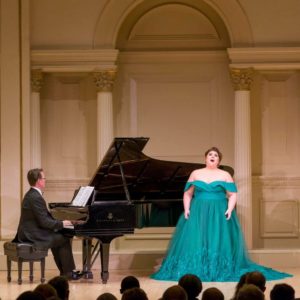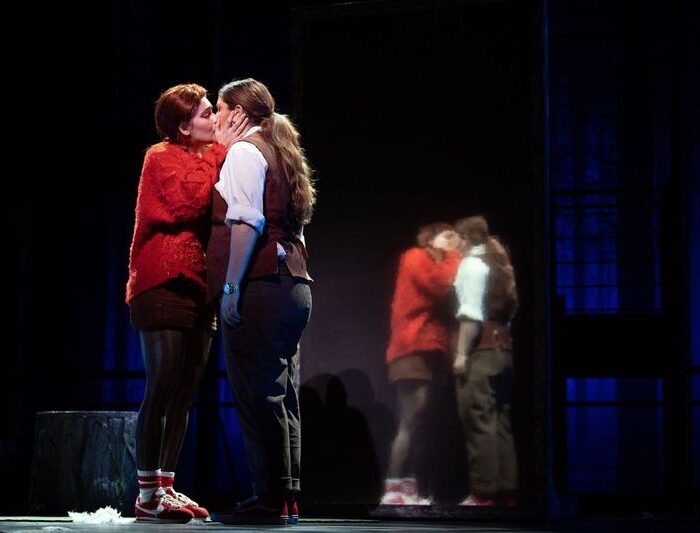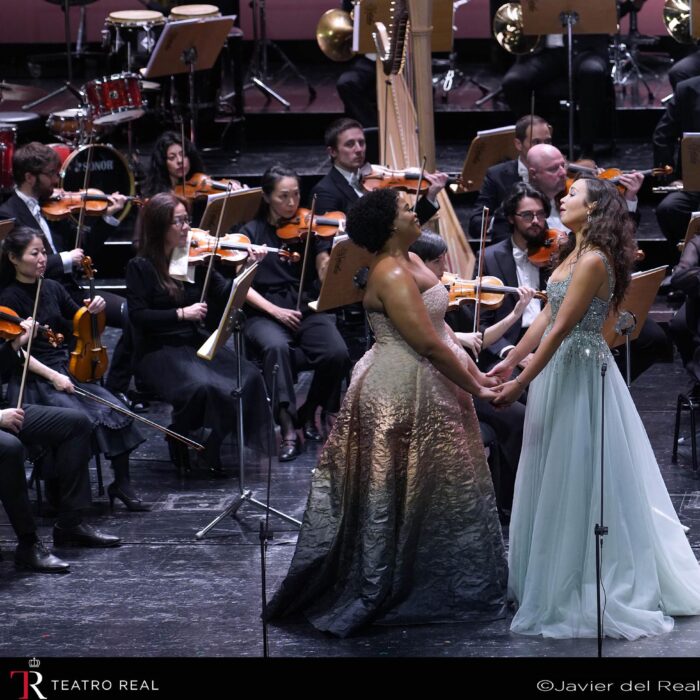
Carnegie Hall 2018-19 Season Review: Leah Crocetto In Recital
Soprano Shows Her Wealth of Sound in Debut Performance
By Logan MartellOn Thursday, November 8, 2018, soprano Leah Crocetto made her Carnegie Hall debut with a diverse program of songs old and new, beloved and obscure. Among these were works from Ottorino Resphigi, Francois Poulenc, Sergei Rachmaninoff, Richard Rodgers, George Gershwin, and more.
Joined by the sensational accompaniment of pianist Mark Markham, Crocetto’s performance made for a stunning showcase of her ability and interpretative depth.
Early Enchantment
First from the art songs of Ottorino Respighi was the piece “Balladeer.” This short number made for a sweet introduction to Crocetto’s vocal instrument.
The second song, “Nebbia,” was more somber in tone, the text being the grim observations of an unnamed, suffering narrator. Crocetto’s vocal climax on the word “silent” in the phrase “the sleeping mists rise from the plain,” came as a sonorous display of pained irony. Between the stanzas of the text, the accompaniment shifted to a series of even, ponderous chords which were suddenly interrupted by a dissonant sting. Awash in the unease created by this chord, Crocetto’s delivery of the phrase “How cold I am! I am alone,” chillingly shifted the focus of the text inward to her emotional state.
The third song, “Night,” bore a more loving, and at peace feeling. This was made clear by the inviting tones heard after outlining the imagery of the gentle beauty of roses and nightingales in the first stanza, her next phrase “O, what sweet mystery,” placing the bow on top. This song ended on a faithful note, as seen by Crocetto’s yearning expression and closing breath.
Poetry in Perpetua
This night saw the New York premiere of Gregory Peebles’ song cycle “Eternal Recurrence.” Peebles describes the cycle thus: “Travel is at the heart of ‘Eternal Recurrence.” It is philosophy’s theory that all existence and energy has been recurring, and will continue to recur, in a self-similar and infinite number of times across infinite time or space.
The opening, using only the piano, expresses the first musical theme and is the invocation of the muse, the entrance into sacred space and the soul’s journey into and clothing itself with flesh. The narrative – albeit abstract – is in the form of the archetypal journey. The principal character is activated by the vastness of experimental possibilities, and sets out, both figuratively and literally, in the hopes of experiencing as much of it as we can bear.”
The first song, “Vivace, Naïve,” fittingly began with a single, extended tone from the accompaniment that rose into an expansive chord. This seeming act of creation was soon met with a strong dissonance that resolved gradually in the melody. After this extended opening, Markham cued Crocetto in to begin the lyrics, containing phrases which were rhythmically identical to the accompaniment, emphasizing the unity found within this beginning song.
By the fourth song, “Liquide, molto rubato,” the songs had established a smooth transition from one to the next. This piece illustrated two different images, connected musically and emotionally. The first was that of the River Seine, likened to a woman; the second was that of Eve watering fruit with her tears. Riding a climactic note from the accompaniment, Crocetto sailed on the heightened emotion that bridged the two seemingly-disparate stanzas of the text.
The song, “Verklart,” set music to a poem from the Roman courtier Gaius Petronius Arbiter, employing not only Latin for the narrative aspects of the next but Greek for the brief exchange of dialogue between a group of boys and the Cumean Sibyl attempting suicide by hanging. This part in the cycle’s narrative is described as seeking death due to a revelation which shows everything to be illusory; a sort of unbearable enlightenment. This was reflected in the music stunningly when, after repeating the text with a rising tempo, Crocetto unleashed a tremendously powerful high note that, when finally concluded, left the air of the Weill Recital Hall ringing for several seconds.
The final number, “Playful, leggiero,” carried light arpeggios, and Crocetto herself carried a feeling of having gracefully synthesized the events of the musical journey. The first line of the text, “Every language is the hardest,” made for a humorous connection to the previous song. While the text expressed an awareness of fragility, it also beckoned one towards strength, saying “So try again and fail again, world without end…” Crocetto’s relaxed humming was responded to by a chord which made its way to return to the single note which opened, and now closed, the cycle of “Eternal Recurrence.”
Oldies but Goldies
After capping off the new cycle, Crocetto sang four numbers that needed little introduction due to their place in The Great American Songbook. First was “The Man I Love,” By George and Ira Gershwin. With a gentle opening from the accompaniment, Crocetto began the opening verse with a natural quality of voice that soon picked up wind and reached a loftier height. The relaxed rhythm at the beginning of the chorus saw Crocetto carrying her lines with a sensual flair. As the song picked up, Markham’s playing featured a stride effect that created a barroom atmosphere in which Crocetto displayed jazzy vibrato and fuller ornamentations.
The third song, Richard Rogers’ “Falling in Love with Love,” bore dejected phrases which Crocetto treated with a defiantly-hopeful lyricism; for all the hopeful energy, this song ended with a touchingly soft refrain neatly tied with the rueful words “but love fell out with me.”
First of her encore numbers was “Can’t Help Lovin’ Dat Man,” from Jerome Kern’s musical “Show Boat.” Crocetto’s velvety crooning seemed perfectly at home with the rhythm of Markham’s accompaniment, whether she was expressing relaxed longing or soulful ornamentations. This number also showcased Crocetto’s luxurious lower register, which came as a highly-alluring contrast to the vocal heights scaled by this soprano throughout the night.
With qualities such as these under her belt, Leah Crocetto will no doubt have much to bring when she performs the role of Leonora in “Il Trovatore” with Seattle Opera.


